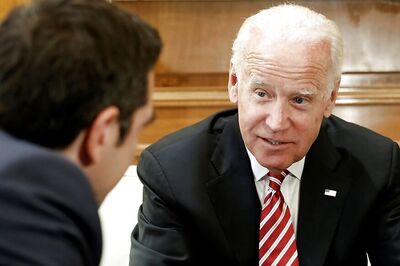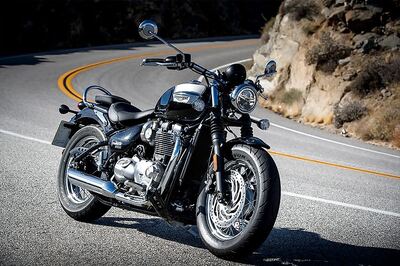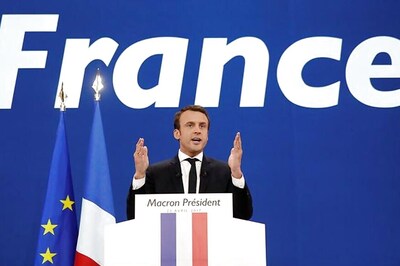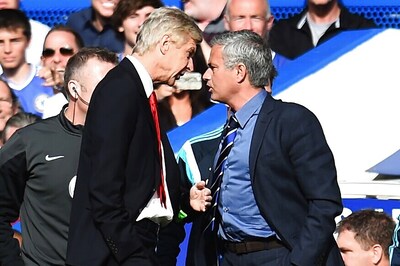
views
Albania player Mirlind Daku was banned on Sunday for two games after leading fans in nationalist chants at the European Championship, that UEFA said brought football into disrepute.
Daku took a megaphone after Albania’s 2-2 draw with Croatia on Wednesday in Hamburg and joined in chanting slogans against Serbia and North Macedonia.
The incidents and fallout from the game in Hamburg have been the most serious involving Balkan politics at a Euros with the most-ever teams from the region playing — and offering a stage for some fans to air its issues.
It also has highlighted rifts in football between Albania and Serbia at a time when their football federations have tried to heal them by teaming up, despite opposition from many fans, in a bid to co-host the Under-21 Euros in 2027.
On Sunday, UEFA said its disciplinary judges found Daku guilty of “failing to comply with the general principles of conduct, for violating the basic rules of decent conduct, for using sports events for manifestations of a non-sporting nature and for bringing the sport of football into disrepute.”
UEFA also ordered the Albanian football federation to pay fines totalling 47,250 euros for incidents at the game where its fans chanted an anti-Serb slogan, reportedly “Kill the Serbs.”
The Serbian football federation said it would quit the tournament if UEFA did not punish the incidents.
On the field, Albania plays a decisive group-stage game on Monday against Spain. If Albania advances, Daku also would sit out the round of 16 game.
Daku later apologized for his actions in a social media posting, as UEFA appointed an in-house investigator to study his “alleged inappropriate behaviour.”
The 26-year-old forward began playing for Albania last year having used his right under FIFA rules to change his eligibility from Kosovo, the ethnic-Albanian former province of Serbia that declared independence 16 years ago.
“For the time being, we are focused on tomorrow’s match. He knows he made a mistake, he apologized and everything ended there,” Albania captain Berat Djimsiti said of his teammate through a translator.
He added: “I am not here to speak about the politics. This is a thing that UEFA has to take care of. In this moment, the main reason why we are here is to play a big game tomorrow.”
UEFA had also announced charges against its member federations of both Albania and Croatia over “potential racist and/or discriminatory conduct” by fans on Wednesday.
However, only Albania was fined for “transmitting provocative messages not fit for a sports event.” The Croatia federation was fined just 27,500 euros for fans lighting and throwing fireworks at the stadium.
UEFA confirmed later Sunday that the racism aspect of the investigation continues.
The Albanian football Federation, or FSHF, called on the fans to be “accountable and avoid incidents and riots.”
“The FSHF invites fans and football lovers to support to the end the Albanian national team in this magical and historic path in Euro 2024 by showing citizenry and accountability through correct behaviour and by respecting the rules and the opponents,” said a statement.
Albania has impressed at Euro 2024 in an opening 2-1 loss against Italy and then the 2-2 draw with Croatia.
With three national teams at Euro 2024 from the former Yugoslavia — Croatia, Serbia and Slovenia — plus Kosovo’s neighbour Albania, fans have shown that their shared history in the brutal Balkans war of the 1990s and diplomatic issues since cannot easily be forgotten.
Nationalist chants raised the hostility levels at Euro 2024 where provocative banners, such as flags with maps, were expected to bring politics into the 10 stadiums in Germany.
Serbia and Albania each were fined by UEFA after their opening games for fans “transmitting a provocative message.” It cost them 10,000 euros each for a first offence.
The Serbian fans’ banner about Kosovo had also led to a FIFA prosecution involving players at the 2022 World Cup in Qatar.
Serbia considers Kosovo the cradle of its statehood and Christian Orthodox religion and is among several European countries that do not recognize its independence.
In Germany last week, a television journalist from Kosovo had his credential cancelled by UEFA after making the two-handed Albanian eagle gesture while broadcasting pitch-side in front of Serbia fans.
The Balkan entries at Euro 2024 could have been five had Bosnia-Herzegovina come through a qualifying playoff bracket in March won by Ukraine.
UEFA’s president Aleksander Čeferin, a lawyer from Slovenia who grew up in the former Yugoslavia, had said while attending Serbia’s decisive qualifying game in November that he would “certainly like” as many teams from the region to qualify as possible.
UEFA has a decision to make this year that could be very symbolic about the sport’s ability to unite, at a time when it blocks in its competition draw ceremonies any pairings of teams from Kosovo against Serbian or Bosnian opponents for security reasons.
The Albania-Serbia candidacy to co-host the Under-21 Euros in 2027 is competing against Belgium and Turkey.
UEFA’s executive committee — which includes a vice president from Albania, Armand Duka — is scheduled to vote on the 2027 host in December.
Stay updated with the latest from Euro 2024. Explore Euro 2024 Match Today. Check Updated list of Highest Goal-Scorer in Euro 2024. CheckEuro 2024 Points Table and Euro 2024 Match Results and Euro 2024 Match Schedule .




















Comments
0 comment